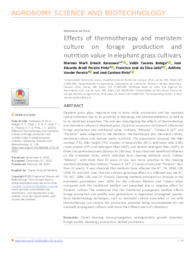Effects of thermotherapy and meristem culture on forage production and nutrition value in elephant grass cultivars.
Effects of thermotherapy and meristem culture on forage production and nutrition value in elephant grass cultivars.
Author(s): KARASAWA, M. N. G.; BOTEGA, V. T.; PINTO, J. E. B. P.; LEDO, F. J. da S.; PEREIRA, A. V.; PINTO, J. C.
Summary: Elephant grass plays important role in dairy cattle production and has received special attention due to its potential in bioenergy and phytoremediation, as well as to its medicinal properties. The aim was investigating the effects of thermotherapy and meristem culture on elephant grass (Cenchrus purpureus (Schumach.) Morrone) forage production and nutritional value. Cultivars 'Mineiro', 'Taiwan A-147' and 'Pioneiro' were subjected to the methods: thermotherapy plus meristem culture, meristem culture and mature stems (control). The experiment assessed the tiller number (TN), tiller height (TH), number of leaves/tiller (NLT), leaf/stem ratio (LSR), crude protein (CP), acid detergent fiber (ADF), and neutral detergent fiber (NDF), at three cuts performed every 60 days for 180 days. It was observed beneficial influence on the evaluated traits, which indicated how cleaning methods work. Cultivar 'Mineiro', with more than 20 years of use, was more sensitive to the cleaning methods showing than cultivars 'Taiwan A-147' (15 years of use) and 'Pioneiro' (less than 10 years). It was observed that methods have affected the NT, TH, SDM, LSR, LDM, CP, and NDF. And, that the cultivars genotype effect in a different way the NT, TH, NLT, SDM, LSR, and CP. Overall, Cleaning methods produced an increase in the evaluated parameters over 100% for the cultivars Mineiro and Taiwan when compared with the traditional method and presented low or negative effect for Pioneiro cultivar This evidenced that the traditional propagation method affects forage production and quality over generations in vegetative propagated species. Basic biotechnology techniques such as meristem culture associated or not with thermotherapy can restore the productive potential being recommended for old asexually propagated cultivars with more than fifteen years of cultivation.
Publication year: 2023
Types of publication: Journal article
Unit: Embrapa Dairy Cattle
Keywords: Biocombustível, Bioenergia, Capim Elefante, Forragem, Qualidade
Observation
Some of Embrapa's publications are published as ePub files. To read them, use or download one of the following free software options to your computer or mobile device. Android: Google Play Books; IOS: iBooks; Windows and Linux: Calibre.
Access other publications
Access the Agricultural Research Database (BDPA) to consult Embrapa's full library collection and records.
Visit Embrapa Bookstore to purchase books and other publications sold by Embrapa.

